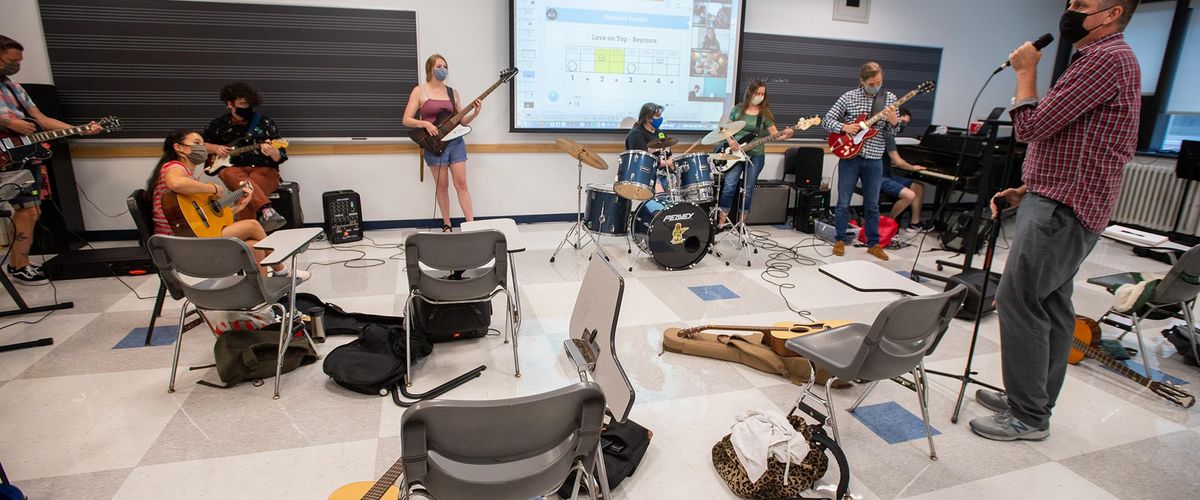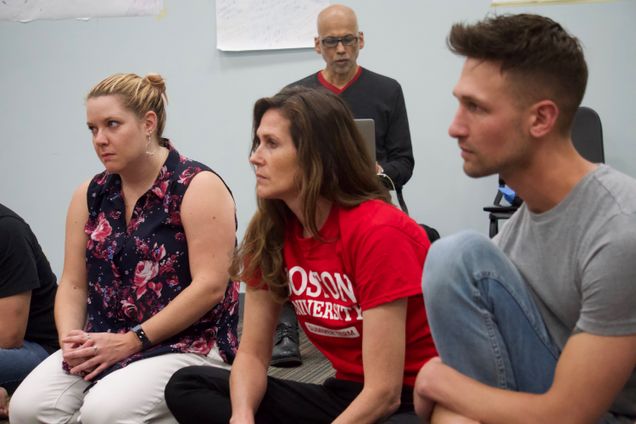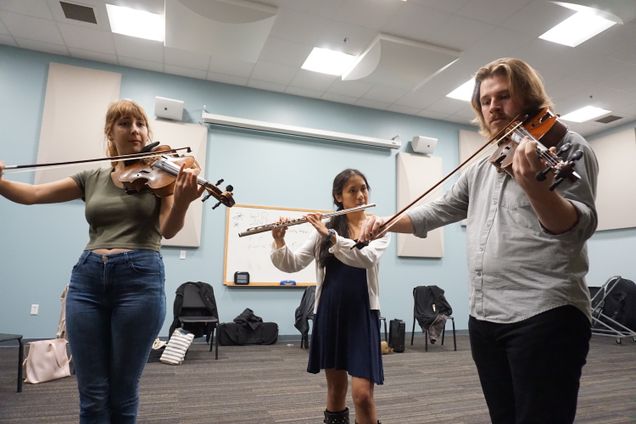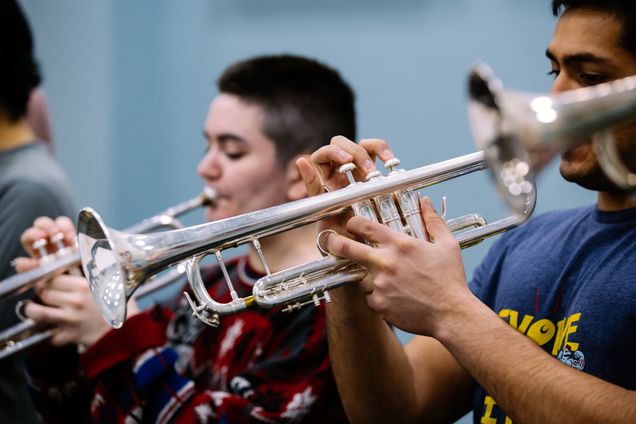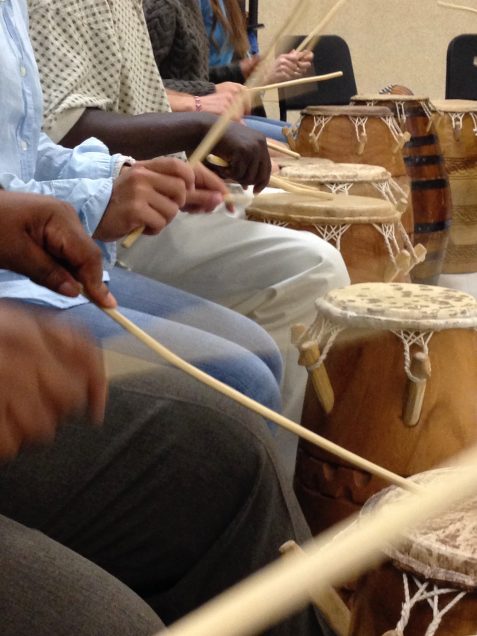The Doctor of Musical Arts (DMA) in Music Education at BU School of Music is a collaborative, on-campus program that prepares music educators for advancement in their field by nurturing them to develop and hone research skills, sharpen proficiency in teaching techniques, and produce a dissertation of publishable quality aimed to advance the field of music education forward. Boston University’s graduate programs in music education have been created for the continuing growth of forward-thinking leaders and educators who serve as advocates for the importance of music in our lives, communities, and schools.
The DMA in Music Education on campus at Boston University is designed to build leadership through scholarship. The program supports those who wish to remain practicing educators yet are eager to take on a greater leadership role in the field of music education by preparing them to advance their careers in preK-12 or community settings. The program also supports those who wish to transition to university-level preservice teacher education and/or research positions. No matter our student’s career goal, the faculty are equally poised to support our student’s leadership and career aspirations.
With an emphasis and commitment to diversity, equity, and inclusion, we expect our graduates to be thought leaders and change agents who create music education opportunities that are socially just and dismantle institutional barriers to traditionally underserved learners in a wide range of settings and learning communities. Doctoral students may concentrate their degree in areas such as diversity, equity, access, and inclusion; antiracist pedagogy; early childhood; musicology/ethnomusicology; music technology; popular music; wellbeing, sustainability, arts integration, eco-justice, and trauma-informed pedagogy or choose to tailor their elective coursework to support their own unique interests.
In addition to taking music education courses on campus, online elective courses are also available to on campus students which affords an exciting opportunity to make connections with a large cohort of peers who currently teach in settings across the nation and world. Given that BU is a world-class research institution, there are also many opportunities to take courses in the School of Education and other allied programs across the university that may further support specialization towards dissertation study. While at BU, many on campus doctoral students have the opportunity to gain valuable experience as a teaching or research assistant and work closely with one of our eleven full-time music education faculty members, some of which will serve on the student’s dissertation committee.
Join our faculty, current students, and alumni as we work collaboratively to ensure that music education is vibrant, accessible, and thriving in every community.
Curriculum requirements for the on-campus DMA in Music Education program can be found on the Academic Bulletin.

Pursuing a DMA in Music Ed from Boston University, you will…
Join a cohort of Boston University doctoral students and an international alumni network of committed musicians, scholars, and agents of social change.
Learn and conduct research with faculty members represent a diversity in approach and expertise, but with a shared commitment toward excellence, diversity, equity, and inclusion.
Concentrate your degree in an area such as diversity, equity, and inclusion; antiracist pedagogy; early childhood; musicology/ethnomusicology; music technology; popular music; wellbeing or a topic of your choosing.
Program of Study
As a Doctor of Musical Arts (DMA) in music education degree student, you will critically examine a variety of research that informs music education. You will discuss and analyze philosophical, sociological, and psychological ideas and problems in the field of music education, and you will cultivate historical, cultural, and theoretical understandings of repertoire and musical works drawn directly from your own classroom or studio. Your scholarly writing and research skills will be honed as you choose from a list of engaging electives on topics relevant to current teaching practice and developing research topics. Your online student colleagues will be music education professionals from around the world, many who will become lifelong friends and professional contacts.
The Music Education faculty aim to prepare students to work effectively within contemporary music and education landscapes. We are a theoretically-grounded and practice-oriented department committed to practices of diversity, equity, access, and inclusion. We expect our students to be flexible musicians and thinkers who strive for excellence, no matter the venue in which they teach.
A supportive, hands-on environment, the on-campus DMA Music Education program includes small class sizes (6-15 students on average) and access to 11 full-time faculty members who are experts in their music education fields as well as dozens of instructors and facilitators who hold terminal degrees in their field. With an emphasis on cutting-edge, research-based pedagogy, all on-campus music education courses are taught by full-time faculty.
At Boston University, Music Education doctoral students can gain university teaching and research experience serving as a teaching or research assistant to one of the faculty. They also have the opportunity to work with faculty performers, composers, and ethno/musicologists who like the music education faculty are leaders in their respective fields, as well as faculty across the College of Fine Arts, the School of Education, and other allied fields. Occasionally, students will have the opportunity to attend The Conversation, a professional conference for the greater BU music education family that features the work of faculty, alumni, and current students as well as invited lectures from leaders in the field.
Doctoral students will gain the valuable theoretical and philosophical knowledge needed to evolve the field of music education. Specifically, they will learn how to vet and apply the best knowledge to inform curricular and pedagogical change, and to create the new knowledge needed to make advances in the field.
Boston University also offers a number of programs that lead to a professional license or certification. DMA students interested in obtaining a teaching license can simultaneously enroll in the Graduate Certificate in PreK-12 Music Teaching program.
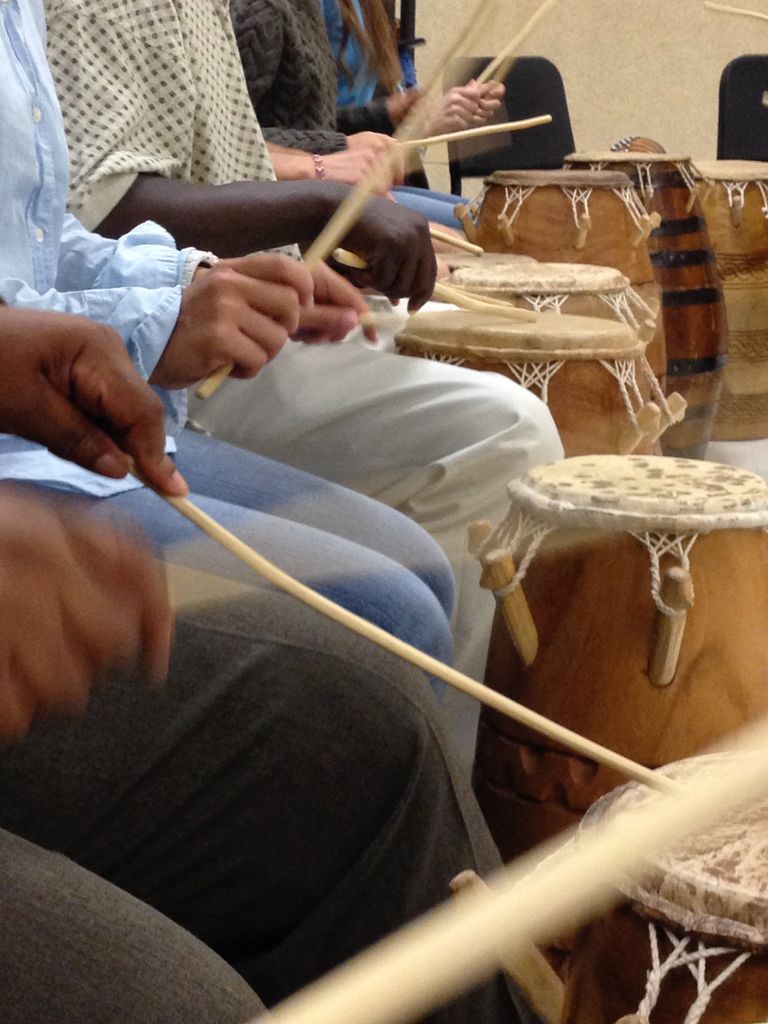

Study at Top-Ranked, Fully Accredited Boston University
As the oldest degree-granting music program in the U.S., BU has shaped generations of music educators and the pedagogy of music education globally, earning a reputation for excellence.


Faculty
-

Kelly Bylica
Assistant Professor of Music, Music Education
-

Diana Dansereau
Associate Professor, Music Education; Chair, Music Education
-

André de Quadros
Professor of Music, Music Education
-

Ruth Debrot
Senior Lecturer, Music Education
-

Andrew Goodrich
Associate Professor of Music, Music Education
-

Karin Hendricks
Director, School of Music; Professor, Music Education
-

Lorenzo Sánchez-Gatt
Lecturer in Music, Music Education
-

Gareth Dylan Smith
Assistant Professor of Music, Music Education
-

Tawnya Smith
Associate Professor of Music, Music Education
-

Kính Vu
Assistant Professor of Music, Music Education

Faculty Feature
Diana Dansereau & Horizons for Homeless Children
Story and photo by Douglas Darrah
From the outside, the Dorchester location of Horizons for Homeless Children looks like every other monolithic brick building in Boston. On the inside, it is warm, colorfully decorated, and full of life. They are, as their website states, “ramping up the fun.” They work to ensure that “every homeless child will have the opportunity to learn, play, and thrive.” Music education plays a key role in that mission. Diana Dansereau, a professor in BU’s College of Fine Arts, helps Horizons fulfill that need.
Most of the infants she works with are between 3 and 12 months. At that age, children can already recognize familiar songs and are learning to sing and move to music. According to an article that she recently wrote, “early engagement with music can set the foundation for a life of music making.” Dansereau also explains that “children can communicate musically well before they communicate with language,” so this early engagement allows the teachers and her to meaningfully connect with the children and know them in new ways.
The children love working with her. They smile and laugh as she greets them with a song. “Hello, hello, how are you today?” she sings in her clear, warm, soprano. “Hello, hello, it’s time to sing and play.”
Once the pleasantries are finished, she sings about their hands and feet. “Hello, hello, hands, how are you today? Hello, hello, hands, it’s time to sing and play.” She gently holds their half dollar sized extremities with her thumb and forefinger.
Gestures and movement play a key role in their group singing. Dansereau connects with the children by sitting on their level and reaching out towards them with her palms up.
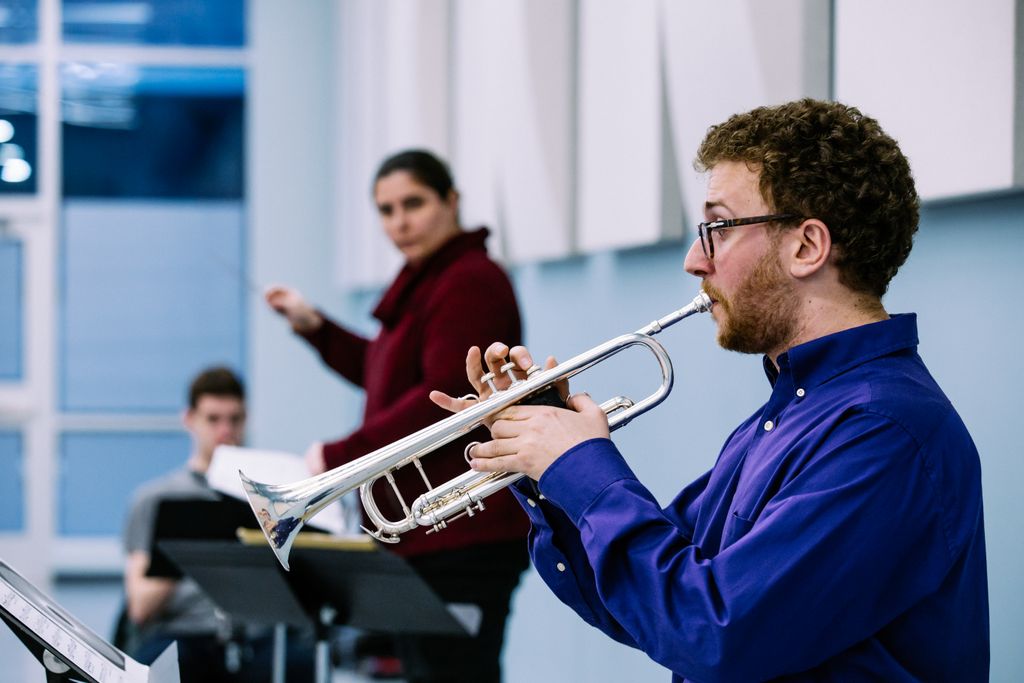
Next Steps for Applicants
The best way to determine if BU is right for you is to explore our admission requirements, financial tools, and resources to determine if the program is the right match. You may also want to consider the Online DMA in Music Education at Boston University.
Reach out to Graduate Admissions at visitSOM@bu.edu with any questions along the way or to request information. We are happy to discuss your educational interests and career goals.
